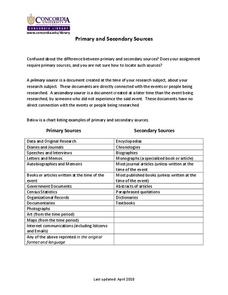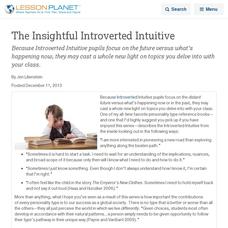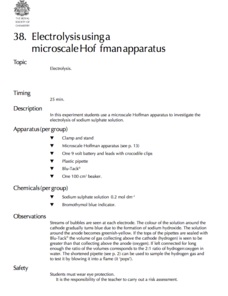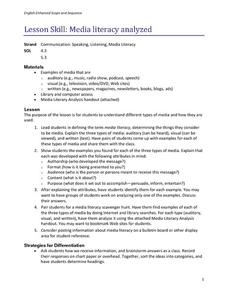Curated OER
Hey, Teacher, Leave My Kids Alone
What are the differences between homeschooling, traditional schooling, and unschooling? Middle and high schoolers examine the opinions of their peers on these varied types of education. After reading a New York Times article, they...
Concordia University
Primary and Secondary Sources
Show your class the difference between primary sources and secondary sources. The first page provides a list of examples of each type of source. While they research, pupils can refer back to the list quickly to make sure they are reading...
ESL Library
ESL Grammar Practice Worksheets: Future Tense
Your class is going to get plenty of practice with these future tense worksheets, but will they enjoy themselves? You will have to find out! Learners practice using going to and will in various exercises, practicing with each type of the...
Curated OER
Perceptions - Frame of Reference
Students understand that a person's perception or judgement of something or someone is greatly influenced by one's frame of reference including one's values, beliefs, experience and country.
Curated OER
Reference Source Four Square
Fourth graders play a four-square game on the playground while reviewing four main references -- dictionary, atlas, thesaurus, and encyclopedia. Students must throw the playground ball in the correct "square" identifying the correct...
Curated OER
Our Class Record Book
Second graders, in groups, prepare a list of proposed record ideas for the class book.
Curated OER
Speak: Questioning Strategy - ReQuest Strategy
The best way to analyze a piece of literature is to ask questions about the characters, plot, and theme. Encourage your learners to stump the teacher with the most difficult questions they can create using Bloom's Taxonomy and various...
Poetry4kids
How to Write Funny Poetry — Chapter 1: Writing Poetry
Do you wish you could write poetry that makes people laugh? Now you can! Check out the first chapter in a poetry writing series that emphasizes the importance of connecting subject matter to a light, bouncy meter.
Curated OER
Getting to Know You
Fifth graders identify strategies to assist in choosing a book. In this book selection lesson, 5th graders discuss ways to determine if a book is the right reading level or on a topic of interest. Students preview several books and...
Curated OER
Bird Identification Worksheet 2
In this bird worksheet, students cross reference materials gathered to identify the bird pictured and fill in 7 boxes with the information gathered.
Curated OER
The Insightful Introverted Intuitive
Because Introverted Intuitive pupils focus on the future versus what’s happening now, they may cast a whole new light on topics you delve into with your class.
Curated OER
Science Puzzlers, Twisters, and Teasers: Chemical Bonding
What a cute approach to chemical bonding! Atoms all have human names and are attending at a dance. Who will pair up with whom? By reading the characteristics, and not the element name, chemistry whizzes figure out the bonding pairs....
Curated OER
Roman Gladiators
Young scholars review basic Latin terms pertaining to Roman gladitorial games, print out pictures of gladiators from Internet, share photos with classmates, choose gladiator to research, and prepare in depth visual and oral presentation...
Curated OER
Insects A-Z!
Alphabet insects! Who has ever heard of such a thing? Get ready because your class is going to research insects that start with a specific letter of the alphabet. In small groups, they'll use the Internet and reference texts to locate...
Curated OER
Science: Schoolyard Trees
Sixth graders choose specific trees to research while taking a nature walk around the schoolyard. They discuss tree and leaf parts and observe various types of leaves. After writing their reports, 6th graders present them to the class...
Curated OER
Hazards: Third Grade Lesson Plans and Activities
Learners discover hazards related to volcanoes and predict the effects these hazards have on people and land. As blossoming geologists explore various volcanic eruptions, including the hazards associated with them, they create their own...
Curated OER
Invisible Life
By setting up an aquarium in the classroom, learners are able to describe some macroscopic and microscopic organisms that are found inside. This well-designed, and educationally rich lesson requires pupils to use microscopes to view...
Royal Society of Chemistry
Electrolysis Using a Microscale Hoffman Apparatus—Microscale Chemistry
Get big results out of a small-scale lab! Young chemists observe the electrolysis of sodium sulfate using a microscale experiment. A colorful indicator solution combined with the production of gas bubbles yields a variety of observations...
Curated OER
Genres, Genres Everywhere
Young readers assume the role of Genre Sleuths to investigate the characteristics of folktales, fantasies, and mysteries. For this session you will need to collect a variety of books on a topic you have been studying. Groups then examine...
Curated OER
The Pearl by John Steinbeck
In this literature learning exercise, students respond to 10 short answer and essay questions about The Pearl. Students may also link to an online interactive quiz on the novel at the bottom of the page.
Curated OER
Lesson Plan 18: Cleaning It Up
Careful proofreading is an important step in the writing process. After guided practice using a provided worksheet that details common grammar concepts, young writers refer to the worksheet as they proofread their own work. Although the...
Curated OER
"Julie of the Wolves"
Fifth graders research life in Alaska and compare life there to their lives in this instructional activity. They read "Julie of the Wolves." They research through the novel and other reference books facts about the Alaskan climate and...
Curated OER
Phineas Gage: Notecard Vocabulary Strategy
Understanding the vocabulary in a text, especially a text like Phineas Gage: A Gruesome but True Story About Brain Science that includes quite a few technical terms, can be the key to understanding the text as a whole. Learners focus on...
Curated OER
Media Literacy Analyzed
Fourth and fifth graders define the term media literacy, then come up with examples that they share with the class. The types of media studied are auditory, visual, and written. Learners get together in pairs and perform a media...

























